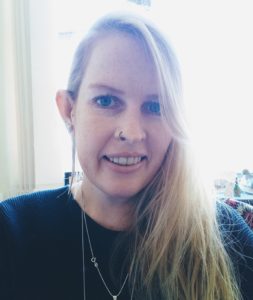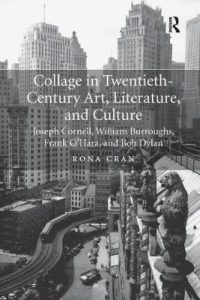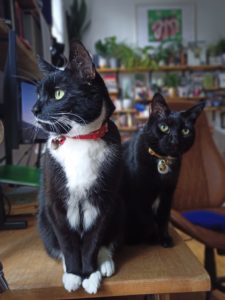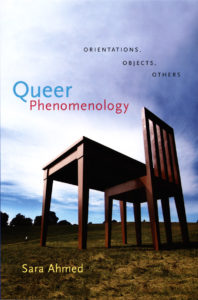Meet the people behind our centre, discover their areas of expertise, interests, and recommendations.

Dr Rona Cran is a Senior Lecturer in Twentieth-Century American Literature at the University of Birmingham and the Co-Director of the Centre for the Study of North America. Their scholarship is interdisciplinary and centres on the literature and culture of New York City, queer writing, and modern American poetry. Rona convenes and teaches the final-year and MA specialist subject modules ‘Multiple Voices: New York City Poetics’ and ‘Modern American Poetry’, contributes lectures to ‘Gender and Sexuality’ and ‘Discovering North American Literature’, and also teaches on the MA module ‘Modernism and Contemporary Literature’. They were the 2020/21 winner of the Guild Outstanding Teaching Award.
Could you tell us a bit about your current research…
My research centres on the literature and culture of New York City, queer writing, and modern American poetry, with an emphasis on literatures of contingency and quiet resistance. I’m currently working on two book projects: an oral history of the New York School, featuring interviews with and poems by around twenty-five New York School poets; and my second monograph, Everyday Rebellion: Poetry and Resistance in New York, 1960-1995, which combines close reading, creative writing, and archival research to explore the relationship between NYC poetry and infrapolitics from the counterculture to the HIV/AIDS pandemic. At the moment I’m writing about the poets who navigated the HIV/AIDS crisis as it unfolded in New York City. My chapter on this subject is intended as an act of scholarly care that takes as its point of departure Melvin Dixon’s dying exhortation at the 1992 OutWrite conference in Boston that ‘the possibility of … good health’ and ‘broadness of … vision’ be martialled in the service not just of remembrance but of ‘the preservation and future’ of the literatures threatened by HIV/AIDS.
At the moment I’m writing about the poets who navigated the HIV/AIDS crisis as it unfolded in New York City. My chapter on this subject is intended as an act of scholarly care that takes as its point of departure Melvin Dixon’s dying exhortation at the 1992 OutWrite conference in Boston that ‘the possibility of … good health’ and ‘broadness of … vision’ be martialled in the service not just of remembrance but of ‘the preservation and future’ of the literatures threatened by HIV/AIDS.
How have you been adjusting to in-person teaching/being on campus once again?
It’s lovely to be able to spend time on our beautiful campus, particularly in the autumn, and again now that it’s spring. I feed the magpies that nest near the Arts building – they come to my office windowsill – so it’s been good to get reacquainted with them. I enjoyed teaching on Zoom – largely thanks to the commitment and enthusiasm last year’s students brought to the format, and to the fact that my cats could attend my classes (they’re connoisseurs of modern American poetry!) – but I love being back in rooms full of people too, not least for the incidental moments that tend to frame seminars and lectures, as we walk or mill about.
In the wider field of contemporary literature and culture research, what are your current obsessions (the areas that interest you the most and you find the most exciting)?
I’ve been spending a lot of time thinking about how the HIV/AIDS pandemic is (and isn’t) represented in culture, and about how this is changing, and has changed over the decades since 1981 when the first cases of what became known as AIDS were reported, and what this means for how the ‘story’ of HIV/AIDS is told and re-told, and, indeed, not told. I’m interested in whose stories are heard, and how, and whose are not, and why. My own focus is on poetry, but research into HIV/AIDS is by its nature highly interdisciplinary, so I’m interested in the ways in which sociological, medical, geographical, and historical research intersects with the literary work that I do.
What are three contemporary texts you read/watched/experienced recently that have had a big impact on you?

I loved Sara Schulman’s monumental oral history, Let the Record Show: a Political History of ACT UP New York, 1987-1993 (2021). It’s a comprehensive, intersectional political history, consisting of over two hundred interviews, that tells the story of ACT UP’s phenomenally creative, effective, intelligent HIV/AIDS activism; and more than that, it’s an activist tactician’s handbook…
Pamela Sneed’s Funeral Diva (2020), which Schulman recommended when she took part in the Queer New York roundtable that I organised back in 2020, is a poetic memoir about coming of age during the AIDS era, the role played by Black women and lesbians as caretakers of the ill and dying, and the aftermath of that in relation to Sneed’s art and life.
Last night I saw Blondie and I can’t stop thinking about that gorgeous punk Debbie Harry onstage in a fuchsia outfit, yellow cape, and sunglasses, hands on hips or striding about the stage singing and talking against a wild animated backdrop that conjured everything from the early ‘80s Lower East Side (‘a hot dark night in New York’) to an outsized (and shattering) anatomical heart of glass.
If you could only recommend one academic text to a novice in your field, what would it be?
 That’s a really tough question – but the work I find myself returning to in all kinds of different contexts is Sara Ahmed’s Queer Phenomenology (2006), a book I love as much for how it is written as for its groundbreaking ideas about queerness and bucking ‘the straight line’ in literature and in life.
That’s a really tough question – but the work I find myself returning to in all kinds of different contexts is Sara Ahmed’s Queer Phenomenology (2006), a book I love as much for how it is written as for its groundbreaking ideas about queerness and bucking ‘the straight line’ in literature and in life.
Do you have anything exciting coming up?
I’m heading to Oklahoma in June to give a keynote talk at the Bob Dylan Center in Tulsa! I’ve also recently returned from a week in Paris, where I was organising a long-rescheduled symposium entitled ‘What we talk about when we talk about the New York School’. It was wonderful to be in Paris in the spring (so many flowers!), surrounded by poets and scholars with a shared commitment to kindness and humour, for what was essentially a festival of listening and conversation and poetry reading.
Are there any activities (volunteering, work, side-projects, collaborations) which are important to your research and approach?
My students are hugely important to my research – I’m continually grateful that I have the opportunity to talk about poetry three times a week with curious, intelligent, funny people who are willing to share their ideas with me. Collaboration matters so much, mostly when it takes the form of friendship – I founded the Network for New York School Studies with a friend, Yasmine Shamma, and the basis of the Network is collaborative friendship (it’s about poets who were friends, but it’s also full of poets and scholars who are friends, and who live by and through those friendships). My current side-project is a memoir about my sister, called I Remember Kim, which follows the form of New York School poet Joe Brainard’s I Remember (1970).
What do you find most supportive/heart-warming at the moment?
The adaptation of Station Eleven (HBO Max, 2021-22) – especially the episode where Jeevan, Kirsten, and Frank act out little Kirsten’s play; the swans nesting on the canal near my flat; open water swimming; Diane Seuss’s frank: sonnets (2021); the Bodega Cats Twitter channel.
